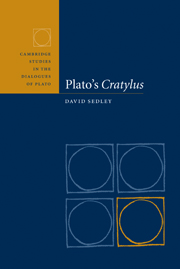Chapter 6 - The limits of etymology
Published online by Cambridge University Press: 22 September 2009
Summary
INTRODUCTION
This chapter's title has a double reference. First, after completing his main etymological survey, Socrates sets out to halt a regress, which threatens to derive each name from component names, and those from sub-components, and so on ad infinitum. He does so by sketching a theory of primary, non-derivative sounds from which compound names are built up. The limit which he here sets is an entirely beneficent one, designed to save the etymological method from incoherence. Second, in Part III Socrates, in discussion now with Cratylus, scrutinises the method in order to see whether it can yield the truths which Cratylus believes can be extracted from words. This time the limits are negative: names can never be relied on as totally accurate depictions. But in no way does this latter limitation threaten to undermine etymology as an exegetical device, only as a philosophical one. So, at any rate, I shall argue, in this chapter and the final one.
HALTING THE REGRESS
At 421c, Socrates has at last completed his survey of the Greek philosophical vocabulary, emphasising above all the theme of fluidity. Hermogenes now quizzes Socrates about the small words which repeatedly recur in these etymologies, choosing, as suggested by the flux theme, the components ion, ‘going’, rheon, ‘flowing’, and, on the opposite side, doun, ‘binding’. These are not all monosyllables, and nothing excludes the possibility that they might be further dissected into their components.
- Type
- Chapter
- Information
- Plato's Cratylus , pp. 123 - 146Publisher: Cambridge University PressPrint publication year: 2003

